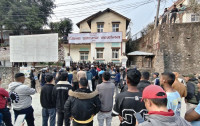National
Nepal’s stated policy keeps it from joining China’s GSI
After opting out of American IPS and SPP initiatives in principle, it looks difficult for Nepal to say yes to the GSI.
Anil Giri
China on Tuesday released a concept paper of its Global Security Initiative (GSI), calling on countries to adapt to the profoundly changing international landscape in a spirit of solidarity, and address the complex and intertwined security challenges with a win-win mindset.
The GSI aims to eliminate the root causes of international conflicts, improve global security governance, encourage joint international efforts to bring more stability and certainty to a volatile and changing era, and promote durable peace and development in the world, said the concept paper which was also subsequently distributed to the Nepali media by the Chinese Embassy in Kathmandu.
Even before formally launching the policy, the Chinese side had already requested Nepal to be a part of the GSI, but the government has yet to clarify its official position.
Government officials told the Post that as per its stated policy, Nepal cannot and will not join any security or military alliance. The position was reiterated last year during the ratification of the Millennium Challenge Nepal Corporation (MCC) compact, a $500 million US aid to Nepal.
While ratifying the compact, a separate 12-point ‘interpretative declaration’ was also endorsed by the Parliament in February, 2022. One of its points stated that being a party to the MCC pact would not make Nepal adhere to any strategic, military or security alliance of the US, Indo-Pacific Strategy included.
“They have released their concept paper,” Bishnu Pukar Shrestha, Nepali ambassador to China said. “But we are yet to make our position clear as this issue needs a lot of consultations.”
The Chinese side had requested for Nepal’s support on the GSI. Director-General of the Department of Asian Affairs of the Chinese Foreign Ministry Liu Jinsong had requested Nepal’s support for the initiative at a meeting with Ambassador Shrestha on December 29. The meeting had taken place as a new government led by Pushpa Kamal Dahal, the chairman of the CPN (Maoist Center), was being formed in Kathmandu.
But Shrestha replied to Liu that as per Nepal’s official policy, it cannot be the part of any military or security alliance.
“China looks forward to deepening mutually beneficial cooperation with the new government of Nepal to advance the high-quality Belt and Road cooperation, jointly promote the implementation of Global Development Initiative and Global Security Initiative, and build a closer China-Nepal community with a shared future,” said the Chinese foreign ministry in a statement on Tuesday.
GSI got traction in Kathmandu, and despite reservations from the Ministry of Foreign Affairs President Bidya Devi Bhandari sent her recorded statement to a GSI-related function organized by the Chinese People’s Association for Peace and Disarmament in Beijing on September 21.
In its letter to the President’s Office on September 17, 2022, the Ministry of Foreign Affairs had stated that as there are ongoing discussions at the highest level on whether to participate in the GSI, the President was advised not to participate in any GSI-related function until the government came up with an official stand on the Chinese proposal.
Earlier, on July 6, writing an opinion piece in the Post, the then Chinese ambassador to Nepal Hou Yanqi said the Nepali side actively supports and responds to the Global Development and Security Initiative.
“China and Nepal share the same or similar views and propositions in adhering to the priority of development, the harmonious coexistence of man and nature, and the vision of common, comprehensive, cooperative and sustainable security,” she wrote.
Later, in August, after a meeting between Foreign Minister Narayan Khadka and his Chinese counterpart Wang Yi in the Chinese city of Qingdao, the Chinese foreign ministry issued a statement claiming that Nepal agreed to the concept of the Global Development Initiative and the Global Security Initiative, and was willing to actively study and participate in the connection.
But the statement issued by the Nepali side on the same occasion was silent on the GSI. Among other things, according to Xinhua, the Chinese state-owned news agency, Wang told Khadka that “China welcomes Nepal to support and participate in the Global Development Initiative and the Global Security Initiative.”
Nepal has been opting out of all security alliances and this position became more vocal after Nepal refused to participate in a BIMSTEC-led joint military drill in September 2018. Later, Nepal refused to join two more security-related initiatives proposed by the US to the government of KP Oli and then to his successor Sher Bahadur Deuba.
The Oli government declined a US request to participate in the US-led Indo-Pacific Strategy, which became highly controversial in the run-up to the parliamentary passage of the MCC compact.
Recently, the Sher Bahadur Deuba government refused to join the US State Partnership Program saying that it carries military and security components and goes against Nepal’s policy of non-alignment.
Now the Ministry of Foreign Affairs is feeling the heat of growing geo-political rivalry in the region and it will soon make formal statements on Nepal’s policy of not joining any security or military alliance, foreign ministry officials said. “This will be done in line with past commitments and pronouncements made by successive governments in the parliament and other forums,” an official at the ministry said, requesting anonymity.
Some security experts also offered the same advice, but said time had also come to take a concrete position.
“Either we should be open to joining security and military-related initiatives forwarded by all countries, or we should not be a part of any of them,” said Purna Silwal, former major general of the Nepal Army.
“India is a good example. It has maintained good relations with the United States but it has not antagonized Russia as well. India’s trade engagements with China are growing despite the many differences between the two sides. Either we have to maintain a similar approach of multiple alignments, or we should opt out of all such alignments,” he said.
Silwal added that it would be difficult for Nepal to sign up to the GSI as it would prevent the country from maintaining security ties with other countries that do not have good relations with China. “So we have to be careful,” said Silwal.
Though the Ministry of Foreign Affairs is yet to make a formal position on the GSI, officials said that as per the stated policy of the state, Nepal will not be the part of any security or military related initiative. “In broader terms, it is our policy not to join in any security umbrella,” said Sewa Lamsal, foreign ministry spokesperson. “We need to take a formal decision on such matters so that there are no such confusions in the future.”
“The Ministry of Foreign Affairs is quite aware of the concept of the GSI, which we have discussed internally….Since our stated policy is not to join any security or military related alliance, the same applies to the GSI as well,” said Lamsal.




 12.12°C Kathmandu
12.12°C Kathmandu














